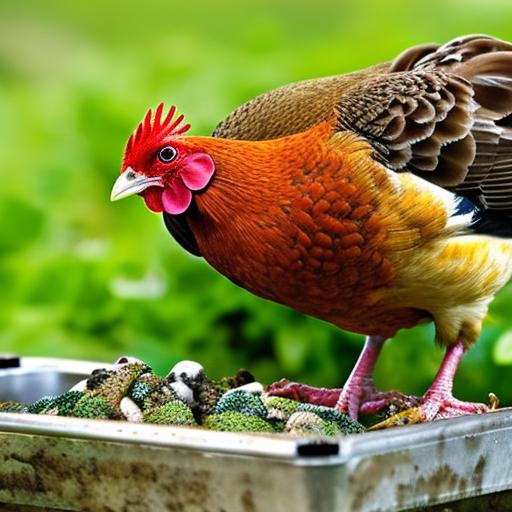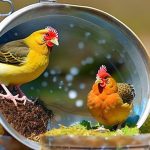Keeping chickens cool in the summer is crucial for their health and well-being. Chickens are susceptible to heat stress and heat stroke, which can have negative effects on their overall health and productivity. There are several ways to keep chickens cool, including providing proper ventilation in the coop, offering shade, installing a misting system, using fans, offering fresh water at all times, adjusting feeding times, treating them to frozen treats, and recognizing signs of heat stress and heat stroke. By taking these precautions, you can ensure that your chickens stay comfortable and healthy during the hot summer months.
Key Takeaways
- Keeping chickens cool in summer is important for their health and well-being.
- A comfortable living space with proper ventilation and insulation is crucial.
- Providing shade and installing misting systems and fans can help regulate temperature.
- Fresh, cool water should be available at all times, and feeding times should be adjusted.
- Frozen treats can be a fun way to keep chickens cool, but it’s important to recognize signs of heat stress and take precautions during heat waves.
Understanding the Importance of Keeping Chickens Cool in Summer
Chickens are particularly susceptible to heat stress and heat stroke because they do not have sweat glands like humans do. Instead, they rely on panting to cool themselves down. When the temperature rises above their comfort zone, chickens can become stressed and their bodies may not be able to cool down effectively. This can lead to heat stress, which can have negative effects on their health and productivity.
Heat stress can cause a decrease in egg production, poor egg quality, reduced fertility, and even death in extreme cases. Chickens that are experiencing heat stress may exhibit symptoms such as panting, droopy wings, lethargy, decreased appetite, and increased water consumption. It is important to take steps to prevent heat stress and keep chickens cool during the summer months.
Creating a Comfortable Living Space for Your Chickens
Proper ventilation is essential for keeping chickens cool in the summer. Good airflow helps to remove hot air and moisture from the coop, keeping the temperature down and preventing the buildup of ammonia from chicken waste. To ensure proper ventilation, make sure that your coop has enough windows or vents that can be opened or closed as needed. You can also install fans or exhaust systems to help circulate air.
The ideal temperature range for chickens is between 65 and 75 degrees Fahrenheit. If the temperature rises above this range, it is important to take additional measures to keep your chickens cool. This can include providing shade, installing a misting system, using fans, offering fresh water at all times, adjusting feeding times, and treating them to frozen treats.
Providing Shade for Your Flock
| Shade Provider | Benefits | Cost | Installation Time |
|---|---|---|---|
| Trees | Provides natural shade and shelter, improves air quality, and reduces heat stress in poultry | Low cost, but requires time for growth and maintenance | Varies depending on tree size and number planted |
| Shade Cloth | Blocks harmful UV rays, reduces heat stress, and provides a cooler environment for poultry | Low to moderate cost, depending on size and quality of cloth | Quick and easy to install |
| Roofed Structures | Provides complete protection from sun, rain, and wind, and can be used for other purposes such as storage or workspace | Higher cost, but durable and long-lasting | Requires time for construction and installation |
Shade is essential for keeping chickens cool in the summer. Direct sunlight can quickly raise the temperature inside the coop and run, making it uncomfortable for your chickens. Providing shade can help to lower the temperature and create a more comfortable environment.
There are several ways to provide shade for your flock. You can use tarps or shade cloth to cover the coop and run, creating a shaded area. Make sure that the shade cloth is securely fastened and does not pose a risk of entanglement for your chickens. You can also plant trees or install awnings to provide natural shade. Just make sure that the trees or awnings do not block airflow or create a fire hazard.
Installing a Misting System for Your Coop
A misting system can be a great way to keep your chickens cool in the summer. The fine mist created by the system helps to lower the temperature and provide relief from the heat. It also helps to keep the air moist, which can be beneficial for chickens that are panting to cool down.
To install a misting system, you will need a water source, tubing, misting nozzles, and a pump or pressure regulator. The tubing should be placed strategically throughout the coop and run, ensuring that all areas are covered by the mist. The misting nozzles should be positioned at a height that allows the mist to reach the chickens without soaking them.
There are different types of misting systems available, including high-pressure systems and low-pressure systems. High-pressure systems produce a fine mist but require more water pressure and may be more expensive to install. Low-pressure systems produce a coarser mist but require less water pressure and are generally more affordable.
Using Fans to Keep the Air Circulating

Fans can be a great tool for keeping the air circulating in the coop and run, helping to lower the temperature and provide relief from the heat. Fans help to move hot air out of the coop and bring in cooler air from outside. They also help to create a breeze, which can make the chickens feel more comfortable.
To properly use fans, make sure that they are positioned in a way that allows for good airflow throughout the coop and run. You can use multiple fans if necessary, placing them strategically to ensure that all areas are covered. It is important to regularly clean and maintain the fans to prevent the buildup of dust and debris.
There are different types of fans available, including box fans, ceiling fans, and exhaust fans. Box fans can be easily mounted on walls or windows, while ceiling fans can be installed in the ceiling of the coop. Exhaust fans are designed to remove hot air from the coop and can be particularly effective in hot climates.
Offering Fresh, Cool Water at All Times
Water is essential for chickens, especially during the hot summer months. Chickens need access to fresh, cool water at all times to stay hydrated and regulate their body temperature. It is important to regularly check and refill their waterers to ensure that they always have access to clean water.
To keep water cool and fresh, you can place ice packs or frozen water bottles in their waterers. This will help to lower the temperature of the water and provide some relief from the heat. You can also provide multiple waterers throughout the coop and run to ensure that all chickens have easy access to water.
There are different types of waterers available, including gravity-fed waterers, nipple waterers, and automatic waterers. Gravity-fed waterers are simple and easy to use, but they can become dirty quickly and may need to be cleaned more frequently. Nipple waterers are more hygienic and can help to prevent water contamination, but they may require some training for the chickens to learn how to use them. Automatic waterers are convenient and can provide a constant supply of fresh water, but they may be more expensive to install.
Adjusting Feeding Times to Avoid Heat Stress
Adjusting feeding times can help to prevent heat stress in chickens. Feeding chickens during the cooler parts of the day, such as early morning or late evening, can help to reduce their metabolic heat production and keep them cool. It is also important to avoid overfeeding during the summer months, as this can increase their metabolic heat production and make them more susceptible to heat stress.
To adjust feeding times, you can provide a smaller portion of feed in the morning and a larger portion in the evening. This will ensure that the chickens have enough energy to get through the day without overloading their digestive system during the hottest parts of the day. It is important to monitor their appetite and adjust their feeding schedule as needed.
The ideal feeding times for chickens during the summer are early morning and late evening when the temperature is cooler. This allows them to eat when they are most active and helps to prevent heat stress.
Treating Your Chickens to Frozen Treats
Frozen treats can be a fun and refreshing way to keep your chickens cool in the summer. Frozen treats not only provide relief from the heat but also offer a source of entertainment and enrichment for your flock.
There are several types of frozen treats that you can make for your chickens. You can freeze fruits such as watermelon, berries, or grapes and offer them as a cool treat. You can also freeze vegetables such as cucumbers or corn on the cob for them to peck at. Another option is to make frozen treats using chicken feed or yogurt mixed with fruits or vegetables. Just make sure to avoid using any ingredients that are toxic to chickens.
To make frozen treats, simply place the desired ingredients in a container or ice cube tray and freeze them until solid. You can then offer the treats to your chickens in their coop or run. Make sure to monitor their consumption and remove any uneaten treats to prevent spoilage.
Recognizing Signs of Heat Stress and Heat Stroke
It is important to be able to recognize the signs of heat stress and heat stroke in chickens so that you can take immediate action to treat them. Heat stress can progress quickly and lead to heat stroke, which can be life-threatening if not treated promptly.
Signs of heat stress in chickens include panting, droopy wings, lethargy, decreased appetite, increased water consumption, and pale combs and wattles. If left untreated, heat stress can progress to heat stroke, which is characterized by rapid breathing, disorientation, convulsions, and even death.
If you suspect that your chickens are experiencing heat stress or heat stroke, it is important to take immediate action. Move them to a cooler area with shade and provide fresh water. You can also mist them with cool water or place them in a shallow pan of cool water to help lower their body temperature. If their condition does not improve or if they show signs of severe distress, it is important to seek veterinary care as soon as possible.
Taking Precautions to Ensure Your Chickens’ Safety During Heat Waves
During heat waves, it is especially important to take extra precautions to ensure your chickens’ safety. Heat waves can be particularly dangerous for chickens and can lead to increased risk of heat stress and heat stroke.
To prepare for a heat wave, make sure that your coop and run are well-ventilated and provide ample shade. You can also place frozen water bottles or ice packs in their coop and run to help lower the temperature. It is important to monitor their behavior and make sure that they have access to fresh, cool water at all times.
During a heat wave, you can also take additional measures to keep your chickens cool. This can include using fans or misting systems to provide additional airflow and moisture. You can also offer frozen treats or adjust their feeding times to help prevent heat stress.
Keeping chickens cool in the summer is crucial for their health and well-being. Heat stress and heat stroke can have negative effects on their overall health and productivity. By providing proper ventilation, shade, misting systems, fans, fresh water, adjusting feeding times, treating them to frozen treats, and recognizing signs of heat stress and heat stroke, you can ensure that your chickens stay comfortable and healthy during the hot summer months. It is important to take the necessary precautions to ensure their safety and well-being during the summer.
Looking for ways to keep your chickens cool during the hot summer months? Check out this informative article on Poultry Wizard that provides helpful tips and tricks for keeping your feathered friends comfortable. From providing shade and proper ventilation to using cooling techniques like misting systems, this article covers it all. Don’t let the heat stress your chickens out, click here to learn more: https://poultrywizard.com/keeping-chickens/how-to-keep-chickens-cool-in-summer/.
FAQs
What are some signs that my chickens are overheating?
Some signs that your chickens may be overheating include panting, lethargy, loss of appetite, and decreased egg production.
What can I do to keep my chickens cool?
You can keep your chickens cool by providing shade, plenty of fresh water, and good ventilation in their coop. You can also give them frozen treats or add electrolytes to their water.
What kind of shade is best for chickens?
The best kind of shade for chickens is natural shade from trees or bushes. You can also provide artificial shade with umbrellas or tarps.
How often should I change my chickens’ water in hot weather?
You should change your chickens’ water at least once a day in hot weather, and more often if it becomes dirty or warm.
Can I give my chickens ice water to cool them down?
No, you should not give your chickens ice water to cool them down. Cold water can shock their system and cause them to stop drinking altogether. Instead, provide cool, fresh water and add electrolytes if necessary.
What should I do if my chickens are still overheating despite my efforts?
If your chickens are still overheating despite your efforts, you may need to move them to a cooler location or provide additional cooling methods such as misters or fans. You should also monitor them closely for signs of heat stress and seek veterinary care if necessary.
Meet Walter, the feathered-friend fanatic of Florida! Nestled in the sunshine state, Walter struts through life with his feathered companions, clucking his way to happiness. With a coop that’s fancier than a five-star hotel, he’s the Don Juan of the chicken world. When he’s not teaching his hens to do the cha-cha, you’ll find him in a heated debate with his prized rooster, Sir Clucks-a-Lot. Walter’s poultry passion is no yolk; he’s the sunny-side-up guy you never knew you needed in your flock of friends!








